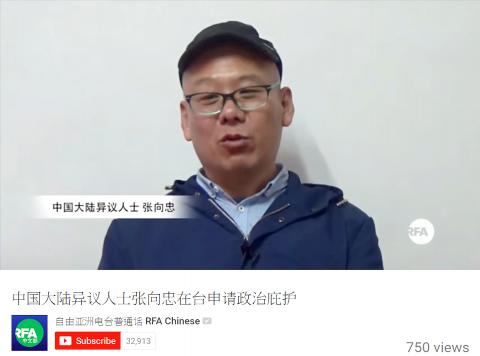Chinese dissident Zhang Xiangzhong (張向忠) on Friday said that he would seek political asylum in Taiwan.
Zhang was part of a tour group on an eight-day tour of Taiwan that arrived on Wednesday.
The Tourism Bureau yesterday said that it was told by the travel agency hosting the group that on Thursday Zhang left the hotel it booked for them and his whereabouts were unknown.

Photo taken from a video on Radio Free Asia’s YouTube channel
Zhang, 48, from Shandong Province, said in an interview with Radio Free Asia that he was jailed for three years after taking part in the “New Citizens’ Movement,” a group that calls for civic spirit based on freedom, justice and love.
Since being released in July last year, he has been under constant surveillance, Zhang said.
Zhang said he was inspired by Lee Ching-yu (李凈瑜), the wife of Taiwanese rights advocate Lee Ming-che (李明哲), when considering leaving the tour group and is to ask the government for political asylum.
Lee Ming-che, a former Democratic Progressive Party worker who is a staff member at Wenshan Community College in Taipei and a volunteer at non-governmental organization Covenants Watch, was detained in China after entering the city of Zhuhai from Macau on March 19.
Lee Ching-yu issued a public letter after the Chinese government annulled her “Taiwan Compatriot Travel Document” on Monday that prevented her from visiting China to search for her husband.
Zhang said he has been moved by Lee Ching-yu’s indomitable spirit and unwillingness to bow to Beijing.
Zhang later yesterday was quoted by the Central News Agency as saying that he has yet to receive word from the government, adding that he plans to visit the Mainland Affairs Council on Tuesday to seek political asylum.
Zhang said he has acquaintances in Taiwan to assist with arranging temporary living quarters and other affairs.
Meanwhile, the council yesterday said that Zhang’s whereabouts were not known, while the National Police Administration and the National Immigration Administration have been informed of Zhang’s actions.
The Tourism Bureau said that it has asked the travel agency to search for Zhang.
Travel agencies — which act as guarantors for visitors using their services — could face a fine of NT$100,000 if a Chinese tourist stays beyond their allotted time.
The Regulations Governing the Approval of People of the Mainland Area Visiting Taiwan for Purposes of Tourism (大陸地區人民來台從事觀光活動許可辦法) states that Chinese tourists can stay in Taiwan for a maximum of 15 days.

Tropical Storm Gaemi strengthened into a typhoon at 2pm yesterday, and could make landfall in Yilan County tomorrow, the Central Weather Administration (CWA) said yesterday. The agency was scheduled to issue a sea warning at 11:30pm yesterday, and could issue a land warning later today. Gaemi was moving north-northwest at 4kph, carrying maximum sustained winds near its center of up to 118.8kph and gusts of 154.8kph. The circumference is forecast to reach eastern Taiwan tomorrow morning, with the center making landfall in Yilan County later that night before departing from the north coast, CWA weather forecaster Kuan Shin-ping (官欣平) said yesterday. Uncertainty remains and

SEA WARNING LIKELY: The storm, named Gaemi, could become a moderate typhoon on Wednesday or Thursday, with the Taipei City Government preparing for flooding A tropical depression east of the Philippines developed into a tropical storm named Gaemi at 2pm yesterday, and was moving toward eastern Taiwan, the Central Weather Administration (CWA) said. Gaemi could begin to affect Taiwan proper on Tuesday, lasting until Friday, and could develop into a moderate typhoon on Wednesday or Thursday, it said. A sea warning for Gaemi could be issued as early as Tuesday morning, it added. Gaemi, the third tropical storm in the Pacific Ocean this typhoon season, is projected to begin moving northwest today, and be closest to Taiwan on Wednesday or Thursday, the agency said. Today, there would likely

DISRUPTIONS: The high-speed rail is to operate as normal, while several airlines either canceled flights or announced early departures or late arrivals Schools and offices in 15 cities and counties are to be closed today due to Typhoon Gaemi, local governments announced last night. The 15 are: Taipei, New Taipei City, Taoyuan, Tainan, Keelung, Hsinchu and Kaohsiung, as well as Yilan, Hualien, Hsinchu, Miaoli, Chiayi, Pingtung, Penghu and Lienchiang counties. People should brace for torrential rainfall brought by the storm, with its center forecast to make landfall on the east coast between tonight and tomorrow morning, the Central Weather Administration (CWA) said. The agency issued a sea warning for the typhoon at 11:30pm on Monday, followed by a land warning at 11:30am yesterday. As of

CASUALTY: A 70-year-old woman was killed by a falling tree in Kaohsiung as the premier warned all government agencies to remain on high alert for the next 24 hours Schools and offices nationwide are to be closed for a second day today as Typhoon Gaemi crosses over the nation, bringing torrential rain and whipping winds. Gaemi was forecast to make landfall late last night. From Tuesday night, its outer band brought substantial rainfall and strong winds to the nation. As of 6:15pm last night, the typhoon’s center was 20km southeast of Hualien County, Central Weather Administration (CWA) data showed. It was moving at 19kph and had a radius of 250km. As of 3pm yesterday, one woman had died, while 58 people were injured, the Central Emergency Operation Center said. The 70-year-old